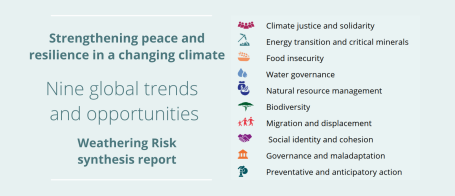Strengthening peace and resilience in a changing climate: Nine global trends and opportunities
Read the full report here.
As global hunger and anti-government sentiments rise, geopolitical tensions increase over access to critical resources needed to transition to a low carbon economy, and many other critical challenges to peace, this report identifies nine pressing global climate security trends and opportunities.
Based on the 43 case studies, assessments, mapping exercises and scenario-based analyses from around the world that were produced under the first phase of the Weathering Risk initiative, and complemented by key climate security publications, this report identifies key structural forces through which climate change is likely to shape peace and security in the next decade. Based on evidence from real world examples, we outline emerging dynamics, key uncertainties and entry points (opportunities) to address these risks.
Through this forward-looking outlook on climate change and security around the world, Weathering Risk seeks to prioritise opportunities to strengthen peace and resilience now to reduce the climate security risks of the future.
Global trends:
- Climate justice and solidarity
As policy makers in Western countries battle rising populism at home and fail to meet Paris commitments to reduce emissions and support adaptation, the burdens of climate impacts, which fall most heavily on low-income and marginalised communities, will increase societal disparities, growing political grievances.
- Critical minerals and the energy transition
The rush to procure and safeguard critical minerals for the energy transition can hinder sustainable, responsible and conflict-sensitive global practices. Efforts towards diversifying the geographical sourcing and processing of critical minerals away from China progress slowly.
- Food security
Forecasts suggest agricultural production will continue to be exacerbated by climate change, likely increasing price volitality in the future. Poorer countries close to the equator with fewer resources will be hardest hit, likely resulting in political instability associated with food price spikes.
- Water governance
While water stress is increasing worldwide, it is not likely to directly spark international conflict. Water also has the potential to be a strong source of international cooperation with renewed focus on water as a central driver to achieve the SDGs and other global agendas like the Paris Agreement.
- Environmental degradation and biodiversity
In almost every region, population growth, rapid urbanisation, rising consumption, desertification, environmental degradation and climate change will combine to diminish biodiversity. Countries will face worsened water scarcity, food insecurity an deeper inequalities as a result.
- Migration and displacement
More people facing loss of livelihoods and liveability in highly climate exposed locations will move to urban centres. Already fragile urban contexts will experience increasing socio-political tensions and political mobilisation as the groundswell catalysed by climate change compounds widening economic inequality, and strains governance and service delivery, especially among marginalised populations. Climate change will amplify existing migration patterns.
- Social cohesion and identity
Climate change will continue to be both a symptom and cause of declining social connection and community cohesion which poses an obstacle to both peace and climate resilience. Climate will continue to be co-opted by political groups to fuel political tribalism which can hamper climate action and fuel political grievances, particularly in the West, whilst the loss of social bonds due to climate stress or climate-related mobility can also drive conflict.
- Governance and maladaptation
Where governance institutions in fragile contexts are unable to provide timely and equitable support or safety nets to deal with the impacts of climate change, more people, especially young people, will choose unsafe coping strategies like illegal logging or joining armed groups.
Discover all Weathering Risk publications here.
Share on


